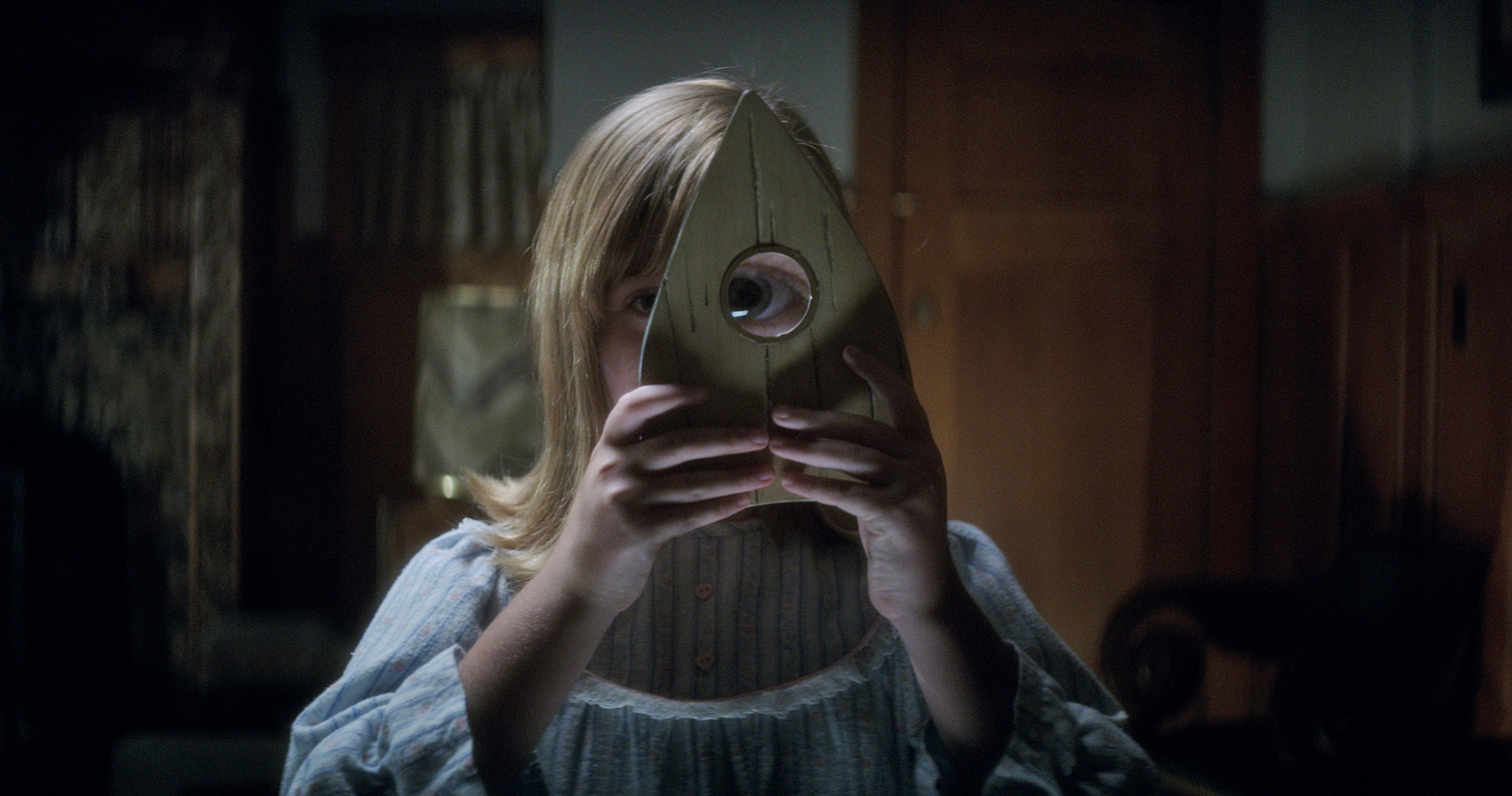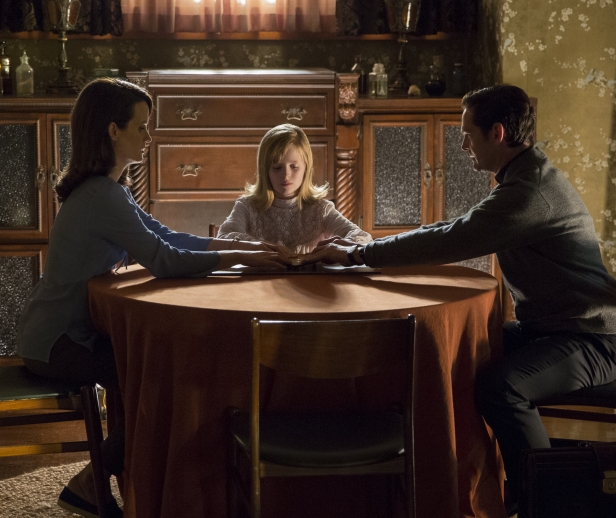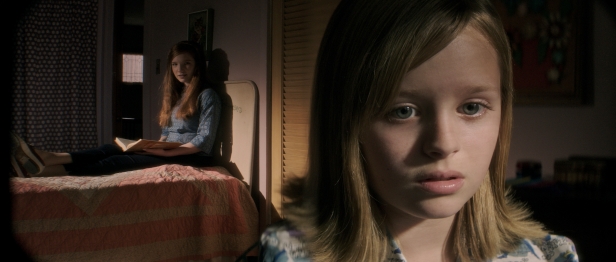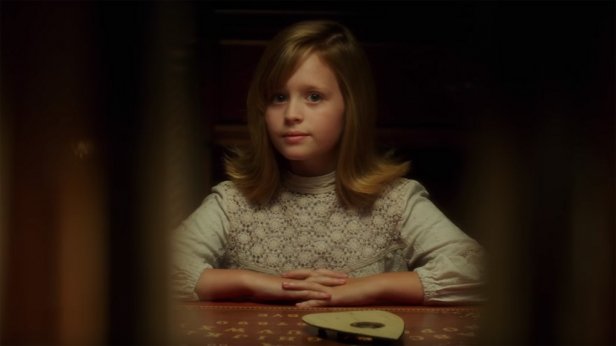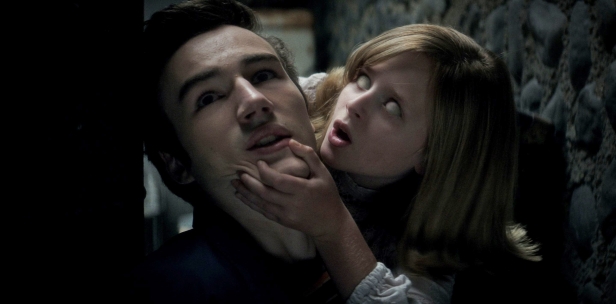We’re big fans of Oculus and Hush director Mike Flanagan, so the announcement that he and his regular co-writer Jeff Howard were making the sequel to 2014 Blumhouse horror Ouija guaranteed our interest. The filmmaker has established himself as one of the most exciting and consistently interesting voices in modern horror, and the idea of his being given free rein on something like Ouija: Origin Of Evil was pretty exciting and he and his team have produced a far superior prequel (read our review here).
We talked to Flanagan about what drew him to the horror prequel, why he always puts characters first, the importance of working with the same team, and why we should all be very excited about his film of Stephen King’s Gerald’s Game.
How did you come to be involved with the sequel to Ouija?
Blumhouse approached me with it. I have a pretty severe allergy to sequels and remakes and things like that, so it wasn’t the most obvious fit, but they were really very forthright from the very beginning about saying that they wanted to take the franchise in a very different direction from the first film and had really left the creative side of it pretty open.
And one of the things that they asked was “What’s that movie that you want to make that no one will let you make right now?” I had pitched the idea of doing a period piece which I was really excited about, focusing on a single mother in the 60s, which is typically not a pitch that’s going to be well received in a studio for a wide release horror film! They were very supportive of that from the very beginning.
I think they legitimately had a desire to not just have a smash and grab sequel, they really wanted to reclaim the franchise and that turned out to be pretty irresistible, actually!
It’s great to see a film like this really focus on the family. Was that always part of your concept for it?
Yeah, I’m always really attracted to familial horror and I tend to shy away from the trope of eliminated teenagers, which I think kind of permeates this genre in a pretty big way. So the chance to deal with a broken family unit and to really lean into this time period, which I’ve really been fascinated by, was hard to say no to.
It’s one of my favourite themes, and this one being PG-13, there’s always this sense that you’re never really going to get to explore those adult themes in a movie that’s going to be available to the teenage viewers. So the fact that they were willing to go down that road on this was a really pleasant surprise and made it not only fit with the kind of movie that I’ve made before and enjoy working on, but it felt very different than a lot of the teen-oriented horror that’s out there.
The cast is fantastic, particularly Elizabeth Reaser and Annalise Basso, who you worked with on Oculus. Did you have actors in mind when you were writing?
I actually was writing it thinking about Annalise. We’d had such a great experience on Oculus that the minute I knew we’d have a teenage protagonist I thought Annalise would be perfect for it, she’d impressed me so much. She was only 13 when we did Oculus and I thought she was so sophisticated, so she was always who I wanted for it.
And then with Elizabeth, I had gotten to know her work with an indie drama called Sweet Land that I really loved that was on the festival circuit back in 2005 when my Oculus short was going around. I tend to gravitate towards actors who do most of their work in dramas and I love actors who work in indie dramas in particular, because I never like to approach these movies as horror movies. They always will go that way!
But I try to imagine that, if we remove all the supernatural elements, I’d still want to watch movies about these characters in the drama space and Elizabeth really embodies that. She’d never done a horror movie before and I loved that about her because from the very beginning we were not approaching Alice as a horror movie heroine. We both kind of agreed that, in a completely different world, the story about this woman running that business at that time would have been a really compelling Sundance film, and we just started there. As we add on the genre elements, we have this bedrock that I think Elizabeth provides really well.
Did Elizabeth, Annalise and Lulu Wilson (who plays young Doris) have time to get to know each other before filming?
Certainly, and one of the things that was very important to me and to Elizabeth was that we give her as much time with the girls as possible before we actually went into production. They fit together very, very well from the very beginning, so a lot of that dynamic has carried on actually after the movie. It was always just a very strong ensemble unit and that’s something that you really want to try and cultivate, even when you’re working within the confines of a genre movie.
When you’re telling the story of a family, you want that family to feel lived in and authentic and have the little quirks and the little details that make it human, instead of saying “Here’s the archetypal family that we’re going to mess with for 90 minutes!” But the three of them are the heart of the movie and we were very fortunate that our actors were able to embody that from the beginning and I think that’s really just a testament to who they are as performers. That they all ended up being friends after is even more wonderful.
It’s a pretty slow burn and we really do get to know the characters before the horror kicks off. Was it tricky to know where and how to introduce the genre elements?
That’s always a tough balance to strike. I tend to put most of my time into the characters, and you know the other shoe has to drop. Finding out when and how hard it drops is an experiment with every movie and you try to feel that out as you’re writing. But the hope for me with every script I write is that, if those elements are never introduced, do I still care about these people, and if the answer’s yet then I’m excited about the movie, and so far I’ve been lucky that the answer’s always been yes.
But yeah, finding the right balance is the challenge. With this one we spent even more time with the family than I had anticipated being allowed to get away with! I really thought that would be where the pushback would come but I think the studio also really liked that dynamic so I was fortunate enough to be able to hold back the genre as long as I could.
You mentioned being fascinated by this time period. What is it about the 1960s that drew you to it?
It’s a really interesting era in American history because we’re coming out of the innocence of the 50s and seeing social and political turmoil unlike the country had ever really seen. And set against that you also have some of the greatest achievements that we made as a species, with the space programme and the moon landing.
So it’s a really fascinating and chaotic time that’s kind of caught between innocence and the painful maturation that I think is represented in the 70s, and that I thought it was really interesting, not only to play with the perception of mediumship, which was actually quite a big deal in the 60s, but it felt like the environment around our characters was also very in tune with where Paulina was in her life and where Alice was in her life at that time. Doris is still caught in the innocence but Paulina and Alice have really had to absorb this emotional chaos that’s come not only from the family but what’s happening in the world around them. That seemed in harmony and it felt very right for this.
There are some brilliant period touches, like the zooms and the vintage Universal logo. Was that fun to play around with?
That was some of the most fun that we had. When DP Michael Fimognari and I were first diving into the aesthetic of what the film should be, we agreed that we didn’t want to just shoot a contemporary movie that had people in costume playing dress up for the period. We wanted it to be more immersive and, even more than that, we wanted the movie to feel the way we remembered some of our first experiences of horror movies feeling when we were growing up.
And for that it was very important to us that we use a lot of zooms instead of gliding steadicams, and bring out the split diopters, and the thing that excited me the most was getting the cigarette burns on the reel changes just because that’s how I remembered experiencing movies, and there was a real nostalgia on our part for that. When Universal started seeing the dailies and seeing what we were actually trying to accomplish aesthetically, they asked “Would you be interested in the classic logo? and it was like “Yes! Absolutely I would!” It sets such a wonderful tone and it’s the first image that people see and when I saw it, it just took me right back.
And that was one of the goals with this movie, to try to recreate the experience that I had when I was 12 and 13, first dipping my toes into this genre, and I thought it would be really fun to try and recreate that for a contemporary audience, especially because PG13 horror has this stigma to it that it’s not as legitimate as its R-rated counterparts, which I just don’t agree with. It really was important to us that we let the entire movie live in that era as opposed to putting on a pageant.
This is your second Blumhouse movie and it sounds as though you had as much freedom as you wanted! Have you enjoyed your experiences working with them?
Oh absolutely. Blumhouse is a force of nature, they are doubtlessly the most prolific creators of genre content in the business, and my relationship with Jason goes all the way back to Oculus which he had come on board to help get distributed because he had enjoyed it at Toronto. And so we’ve collaborated now on several things, and one of the things that’s great about the company is that they want filmmakers to have as much creative freedom as they can give them. They’re very supportive for filmmakers and it’s been a wonderful partnership.
And the other element of that is my producing partner Trevor Macy from Intrepid Pictures, who’s produced everything I’ve made since Oculus and had co-produced Hush with Blumhouse and came onto Ouija as a co-executive producer. I’ve been very lucky in forging relationships with producers and production companies and studios that have been really mutually beneficial and really fulfilling. I’ve been able to work with the same people again and again which is just wonderful, because you develop a trust and I think that’s something that Trevor and Jason Blum and I have in spades at this point.
I assume that also goes for Jeff Howard, who you’ve written pretty much everything with!
Oh yeah, we’ve been writing together since 2004. And I think we counted a couple of weeks ago, we’ve written something like 22 scripts together now! It’s all about building a family. Most of my department heads on Ouija were my production heads on my other films as well. Mike Fimognari, we’ve done 4 movies together, Patricio M Farrell, our production designer on Ouija, we had done Before I Wake together, Lynn Falconer who did the costumes has done all of my films.
We’ve been building this core unit of really wonderful, talented filmmakers and I think what’s great about that is that we interact with each other in a way that’s become second nature. And it’s very important to me, getting to work with the same crew and, when I can, the same cast again is truly exciting, because I think a lot of people don’t have those chances. Every movie is kind of a brand new universe that you’re building and it’s really wonderful to be able to do that with people I know and I trust.
And you’re finally making Gerald’s Game next!
It’s going to be a lot of the same people! I’ve been waiting to make that movie since I was 19 years old, so I kind of feel like, in a lot of ways they’ve all been building up to this one, but I’m eagerly getting started on that right now.
I’m a huge fan of the book so I can’t wait to see it!
Oh! You’re going to love it! It’s going to be wild! It might be the most challenging piece of source material in the world but I’ve been watching this movie in my head for so many years that I’m just excited for everybody else to finally get to see it.
Ouija: Origin Of Evil is released in cinemas on 21 October. Read our review here and keep up with the latest genre news with the new issue of SciFiNow.
